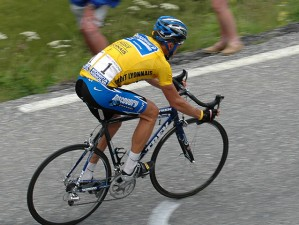(单词翻译:单击)

"It's a great rarity today for someone to achieve athletic success who doesn't take drugs." That quote seems rather timely, in the wake of the news that cyclist Lance Armstrong will no longer fight the accusations of doping leveled at him by the U.S. Anti-Doping Agency. The charges may cost Armstrong all seven of his Tour de France titles. The development in Armstrong's case follows two recent drug suspensions in baseball-in the past 10 days Melky Cabrera, an All-Star outfielder for the San Francisco Giants, and Bartolo Colón, a starting pitcher for the Oakland Athletics, both received 50-game bans after testing positive for artificial testosterone.
"如果现在有人不通过服药而在体育赛事上获胜,那是十分罕见的。"随着自行车手阿姆斯特朗接受美国反兴奋剂机构调查其服用药物一事落下尾声,引用这句话显得十分及时。这次对阿姆斯特朗的判决将取消他的7个环法冠军头衔。紧接着阿姆斯特朗的案件,最近两起棒球赛事的服药事件——过去10天,效力于旧金山巨人队的全明星外场手Melky Cabrera和奥克兰运动家队的先发投手Bartolo Colón被查出因服用人造睾丸激素而呈现阳性,两个人得到500场禁赛的处分。
But the quote above has nothing to do with modern-day athletics. It comes from a retired track coach quoted in a 1971 New York Times Magazine article. (The article's author, sportswriter and activist Jack Scott, who died in 2000, has one of the more interesting biographies you'll find-Oberlin College athletic director, Bill Walton confidant, onetime suspected associate of the Symbionese Liberation Army.) Whether or not the coach's statement then was somewhat hyperbolic, it's clear that the drug problem has loomed over the sports world for a long time. And although the abuses in cycling have become harder to ignore in just the past two decades, the sport has been home to all manner of chemical enhancements for more than 100 years.
上述引用的句子与现代体育无任何关联。它是一个退休的田径教练从1971年的《纽约时报》的一篇文章引用的一个句子。(这篇文章的作者Jack Scott,体育专栏作者和激进主义分子,2000年逝世,著有很有意思的自传,如《奥柏林学院体育系主任》,《比尔沃顿密友录》,《怀疑是共生解放军的同事》)。不管这个教练的说法有否点夸张,很明显涉药问题很长时间在体育界已愈发凸显。尽管在过去的20年里,自行车的涉药事件很难忽视,体育成为化学增强剂的常客已有100多年之久。
Jacques Anquetil, a French cyclist who won the Tour de France five times in the 1950s and 1960s, openly admitted to doping. "Everyone in cycling dopes himself," he said in Scott's 1971 article. "Those who claim they don't are liars." In Anquetil's era, the agents of choice were stimulants such as amphetamines, but as early as the late 1800s cyclists fueled up with a mixture of coca leaf extract and wine called Vin Mariani, according to a 1983 Hastings Center report.
曾经在1950s和1960s间五次获得环法冠军的法国自行车手Jacques Anquetil,公开承认服用药物。在Scott1971年的文章中,Jacques Anquetil 说:"每个自行车手都有服药。"同样,"每个不承认他服过药的人都是骗子。"在Anquetil眼里,药物的选择有像安非他命这样的刺激物,但在1800s晚期,据海斯汀中心1983年的报道,自行车手刺激兴奋的选择包括可卡叶的提取物和一种叫做维马里亚尼酒的混合品。
Baseball, too, had its period of rampant amphetamine use, which is viewed in an almost nostalgic light now that stronger performance enhancers such as anabolic steroids and human growth hormone have tainted the game's image. But in endurance sports such as cycling, performance enhancement can be especially deadly. At the 1960 Summer Olympics in Rome, a Danish cyclist named Knud Enemark Jensen lost consciousness during a race, fell from his bicycle and died. Postmortem tests reportedly revealed the presence of amphetamines in his system. After English rider Tom Simpson collapsed and died during the 1967 Tour de France, amphetamines were found both in his bloodstream and in a vial tucked inside his jersey.
同样地,棒球也有一段泛滥的安非他命用药期,这在今天看来显得有点过时。现在更强力的增强剂,如同化激素和生长激素玷污了比赛的形象。但在耐力比赛,尤其是自行车这样的比赛中,性能增强剂是致命的。在1960年罗马夏季奥运会上,一名来自丹麦的自行车手Knud Enemark Jensen在比赛中失去知觉,从车上倒下死亡。验尸报告显示在他的体内发现安非他命。此后,英国自行车手Tom Simpson在1967年的环法比赛上死亡,在他的血液和塞在运动衣的小瓶里也都发现了安非他命。
More recently, cyclists have boosted their endurance with the use of an artificial version of the hormone erythropoietin, or EPO, which stimulates red blood cell production and boosts the oxygen-carrying capacity of the blood. Danish cyclist Bjarne Riis, who won the 1996 Tour de France, later admitted that he used EPO during that time.
最近,自行车手服用人造的激素促红细胞生成素或称作EPO使耐力增强。EPO刺激红细胞生成,增大血液载养量。1996年环法冠军,来自丹麦的自行车手Bjarne Riis,后来承认他在比赛时服用EPO。
EPO thickens the blood, and it also has proved dangerous. After a spate of suspicious rider deaths, a 1991 New York Times article highlighted the deadly potential of the drug du jour. "There is no absolute proof, but there's so much smoke that most of us are convinced," University of Oklahoma hematologist Randy Eichner told the newspaper. "You just don't get 18 deaths in four years, mysteriously, with 10 of them attributed to cardiac problems."
EPO虽然使血液变稠, 但它也被证明是危险的。在大量可疑的自行车手死亡后,1991年《纽约时报》的一篇文章突出了自行车比赛用药的潜在致命后果。奥克莱大学血液病医生Randy Eichner说:"虽然没有绝对证据指出这一危险,但正如我们确信的那样,这的确有猫腻。""不可能在4年平白无故产生18起死亡案例,而且其中10例都是心脏问题。"
Cycling insiders, too, noticed drastic changes in 1991. That is the year that three-time Tour de France winner Greg LeMond thinks that EPO took over his sport. As he told Scientific American writer Michael Shermer in 2008, "Something was different in the 1991 Tour. There were riders from previous years who couldn't stay on my wheel who were now dropping me on even modest climbs." LeMond had won the race the two previous years, but he fell to seventh place in 1991.
自行车业内人士也在1991年发现重大变化。这一年3届环法冠军得主Greg LeMond认为EPO成为他比赛的焦点。LeMond在过去两年赢得比赛但在1991年只得了第七。他在2008年告诉科学美国作家Michael Shermer"1991年的环法比赛有些不同。去年的不如我的自行车手现在在一般的坡道上却能抛下我。"


